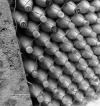Abstract
ABSTRACTTwo of the main problems of mankind are the lack of housing and the accumulation of solid waste and garbage thatultimately brings environmental problems. Within this solid waste are plastics such as the PET bottles (for examplesoda bottles). In order to try to solve both problems, since 2001 Eco-Tec Soluciones has pioneered in the constructionof houses and water storage structures with PET bottles filled with rammed earth. Groups GRIME and Estructuras yConstrucción of the Pontificia Universidad Javeriana, associated with Eco-Tec Soluciones, documented the constructiveprocess and performed tests to evaluate the mechanical resistance to compression forces of earth-filled PET bottles.Pilot tests were also carried put for the mechanical behavior of walls made with earth-filled PET bottles subjected toloads perpendicular to the plane of the wall. These results and analyses are presented in this paper.The paper presents the main results of the research project “Construction with PET plastic bottles” developed by theMaterials and Structures Research Group (GRIME) in conjunction with the Structures group of the Pontificia UniversidadJaveriana. The authors wish to thank the Department of Architecture and Civil Engineering Laboratory at the PontificiaUniversidad Javeriana for its support during the development of this research.Apuntes is registered under a Creative Commons Attribution 4.0 International Public License. Thus, this work may be reproduced, distributed, and publicly shared in digital format, as long as the names of the authors and Pontificia Universidad Javeriana are acknowledged. Others are allowed to quote, adapt, transform, auto-archive, republish, and create based on this material, for any purpose (even commercial ones), provided the authorship is duly acknowledged, a link to the original work is provided, and it is specified if changes have been made. Pontificia Universidad Javeriana does not hold the rights of published works and the authors are solely responsible for the contents of their works; they keep the moral, intellectual, privacy, and publicity rights.
Approving the intervention of the work (review, copy-editing, translation, layout) and the following outreach, are granted through an use license and not through an assignment of rights. This means the journal and Pontificia Universidad Javeriana cannot be held responsible for any ethical malpractice by the authors. As a consequence of the protection granted by the use license, the journal is not required to publish recantations or modify information already published, unless the errata stems from the editorial management process. Publishing contents in this journal does not generate royalties for contributors.


